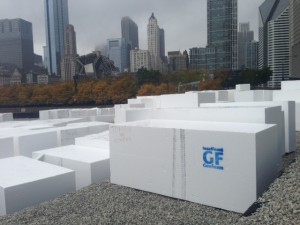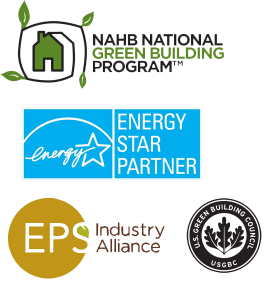
Read recent news on the Maggie Daley Project via the Construction Specifier, November 2014: Geosynthetics for new Chicago downtown park
Landscape architects rely on InsulFoam GF EPS geofoam to form hills and contours on top of downtown parking garage
Famed for its public parks and art, Chicago is building another signature outdoor space in the midst of its downtown. The 20-acre Maggie Daley Park on the Lake Michigan shoreline will provide residents and visitors with plenty of space to relax and play year around.
One challenge facing the project’s landscape architects was how to construct hills and landscape contours throughout the space, including on top of the East Monroe Street Parking Garage, which lies underneath the park. Soil would be the typical choice, but would have been too heavy for the garage to support.
Instead, the park designers specified expanded polystyrene (EPS) geofoam as a durable, yet ultra-lightweight fill alternative. Geofoam is approximately 100 times lighter than soil (0.7 to 2.85 pounds per cubic foot compared to 110 to 120 pounds per cubic foot) so it enabled designers to create a visually interesting landscape and still keep the garage in place. Despite its low weight, EPS geofoam is strong enough to support the weight of jet aircraft and locomotives as demonstrated by its successful use as a subgrade for runways, taxiways and rail beds. “I think it allows you the freedom to be creative,” said Peter Schaudt, FASLA, partner with Hoerr Schaudt Landscape Architects, as quoted in an article in the Chicago Sun-Times.
Contractors are installing 65,000 cubic yards of InsulFoam GF EPS geofoam supplied from the company’s plant in Mead, Nebraska. In addition to new geofoam, crews are reusing geofoam that had been previously installed in Chicago’s Daley Bicentennial Plaza.
InsulFoam® GF does not require surcharging, preloading, or staging often necessary with other fills. It resists moisture, freeze-thaw damage, insects, mold, and decomposition. An environmentally responsible material, InsulFoam GF is inert, does not emit undesirable gases or leachates, and is recyclable. Common uses include soft soil remediation, slope stabilization, structural void fill, and engineered applications for large residential and commercial buildings, as well as infrastructure projects from highways to airports.






